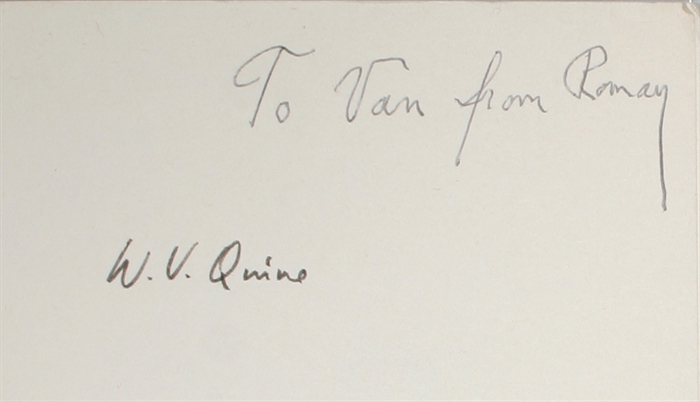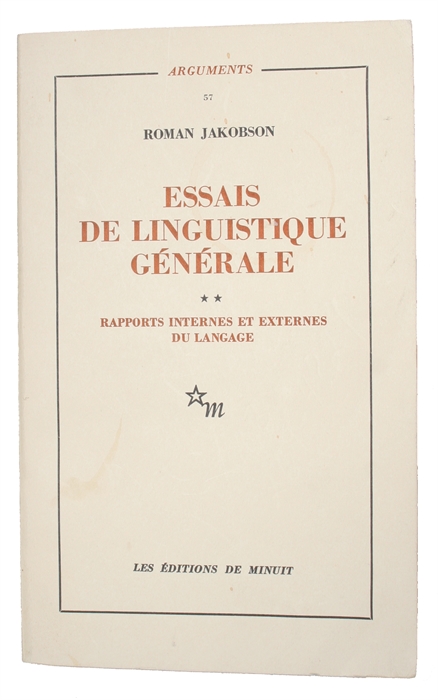PRESENTATION-COPY FOR QUINE
JAKOBSON, ROMAN.
Essais de linguistique générale **. Rapports internes et externes du langage.
(Paris), Les Éditions de Minuit, (1973). 8vo. Original printed wrappers. Minor soiling to front wrapper, otherwise a very nice and clean copy. 317, (3) pp.
First edition of one of Jakobson's late works, in which he summarizes many of his fundamental theories and makes them accessible. The work is inscribed "To Van from Roman" and bears the ownership signature of "W.V. Quine" to the half-title. As such, the present copy constitutes a magnificent link between two of the greatest theoreticians of language of the 20th century, on the one hand Roman Jakobson, the pioneer of the structural analysis of language and the linguist who most profoundly altered the field in the 20th century, and Willard Orman Van Quine, the great philosopher of logic and language, who altered the way that all Anglo-American philosophy of language and logic is conducted.
Roman Osipovich Jakobson (1896 - 1982) was a famous Russian linguist and literary critic, who became one of the most influential linguists of the 20th century. He is probably most famous as the pioneer of structural analysis of language and as the co-founder of structuralism.
Jakobson was born into a Russian Jewish family. Early on, he showed a great interest in the theory of language, and already as a student he became a leading figure of the Moscow Linguistic Circle. He was very much influenced by Husserl's phenomenology and the work of Saussure, and he developed a deep interest in the question of how language, the human speech, functions and is possible.
Due to political troubles in Russia, in 1920 Jakobsen moved to Prague, where he was to become even more influential. He here, in 1926, co-founded the Prague School of linguistic theory, together with the Copenhagen School, the most influential school of linguistics of its time and of decades to come.
When the Second World War broke out, Jakobson moved to Scandinavia, where he met the Copenhagen School of linguistics and its main figure, Louis Hjelmslev. Later he fled to America, where he met Quine, Claude Lévi-Strauss, Bloomfeld and many other important thinkers within the field of language theory. There is no doubt that many of the thinkers that he met here, including Quine, were greatly influenced by the seminal thoughts of the man who had altered all linguistic thought and research.
Jakobson's structuralist theories of language differentiate much from other parts of the structuralist movement in that he constantly bases them on knowledge from other sciences, from mathematics, philosophy, psychology etc., and as such, Jakobson's theories are among the most influential and wide-ranging in the history of linguistics, as they come to also affect and profoundly influence several other scientific fields.
Order-nr.: 42792


